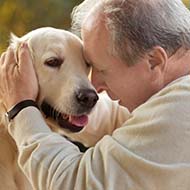
It considers the positive impact of pet ownership over the COVID-19 pandemic.
A recent study from the University of West Scotland has examined the links between companion animal ownership, loneliness and wellbeing throughout the course of the COVID-19 pandemic.
Led by researchers from the university, and supported by the Waltham Petcare Science Institute, the large-scale study used an embedded mixed-methods design, with a qualitative component embedded within the larger quantitative study.
Findings showed that the cross-sectional data showed no association between pet ownership and loneliness, however, qualitative findings discovered that pet owners believe that the association exists.
Published in Animals, the open-access journal, the study, entitled 'Companion Animal Type and Level of Engagement Matter', demonstrated that many pet owners perceive psychological and emotional benefits from their relationship with their pets, and that this perception may translate into a closer bond pets, and potentially improved mental well-being and loneliness.
Of the 1199 participants, those who kept companion animals overwhelmingly rated them as having a positive effect on their well-being during the pandemic, with 85 per cent of dog owners and 75 per cent of cat owners surveyed believing that their pets had an extremely or moderately positive effect on them.
Fewer dog and cat owners, 10 per cent and 20 per cent respectively, believed that their pet had a slightly positive effect or no effect at all, whilst fish owners were fairly evenly split across all four of these categories. Only a small minority or participants rated their pets as having a negative effect on their wellbeing.
Heather Clements, PhD student on the study, commented on the findings: “Despite being physically isolated from friends, family or colleagues, having a pet meant never truly being alone.
“Companion animals not only helped to take their guardians’ minds off negative thoughts associated with the pandemic, but also provided a much-needed source of purpose.”
Several of the participants suggested that their companion animal provided a source os purpose and positive distraction. Recognising their responsibility to their pets, they continued daily routines of walking and feeding times to provide structure for their pet, therefore adding structure to the participant's day and allowing them to experience a facet of normal life throughout the pandemic.
The watching of ornamental fish was frequently cited in the survey as being a welcome distraction, however they were perceived as having a less positive effect than cats or dogs, potentially due to the lack of comfort through physical touch.
Researchers acknowledge that while many participants indicated that their companion animal positively impacted their wellbeing over the COVID-19 pandemic, the duration of the study was limited to a two week period.
Further long term studies are needed to provide insight into the longevity of these effects and how transient they may be.
Darren Logan, head of research at the Waltham Petcare Science Institute, commented: “Identifying the specific aspects of keeping companion animals that were beneficial during the pandemic will allow researchers to develop and test more theories regarding the impact of the human-animal bond for people and animals alike.”



 The latest
The latest